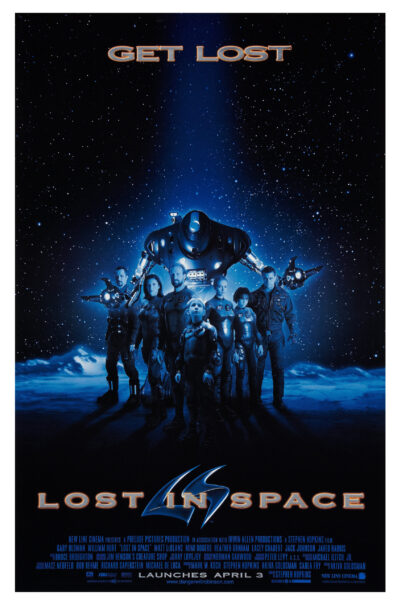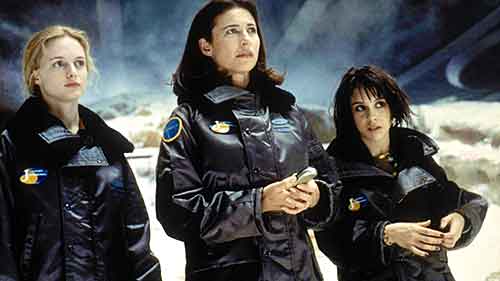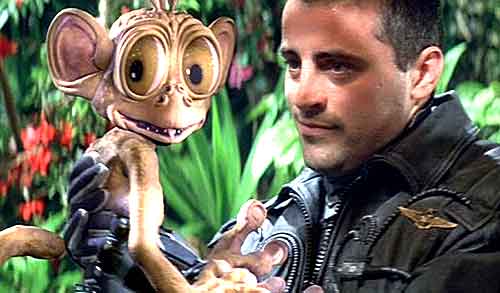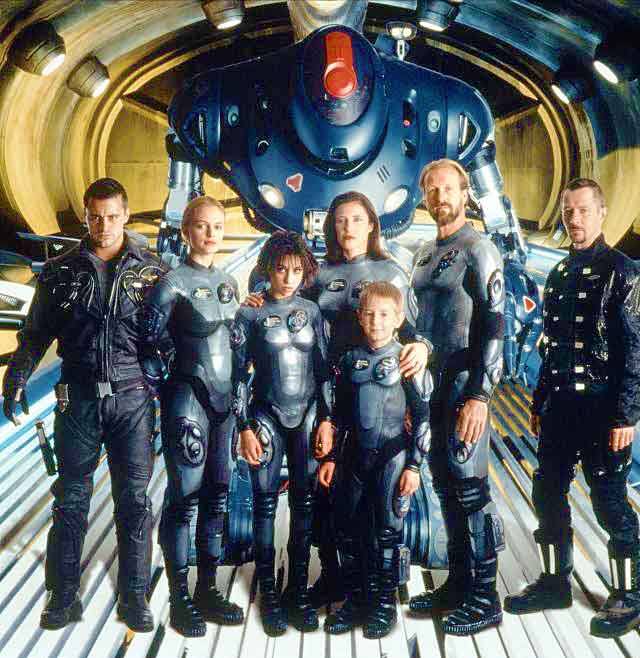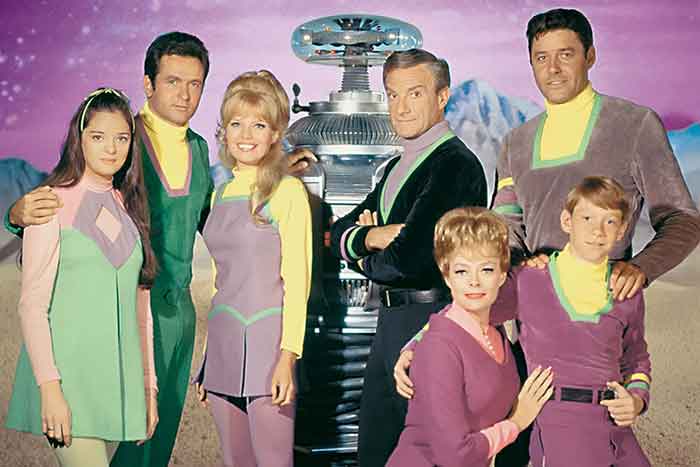An adaptation of the classic TV series LOST IN SPACE that could have been worthwhile but isn’t. The film’s main perpetrators were director Stephen Hopkins (coming off BLOWN AWAY and THE GHOST AND THE DARKNESS) and screenwriter Akiva Goldsman (coming off BATMAN & ROBIN)—whose script, for once, wasn’t the weakest link.
LOST IN SPACE TV SERIES 1965 (Trailer)
On the small screen LOST IN SPACE ran from 1965-68 (alongside the more iconic STAR TREK). An outer space variant on THE SWISS FAMILY ROBINSON, it featured an apparently typical American family who following a botched attempt at colonizing a distant planet found themselves lost in space in the company of a goofy looking robot (iconically voiced by Dick Tufeld) and an evil doctor. The show is best known these days for the Tufeld voiced line “Danger, Will Robinson!” and for the lame (although still better than this movie) 2018-21 Netflix reboot.
“Danger Will Robinson! Danger!”
This 1998 film version, in which several of the actors from the initial series made cameo appearances, was put into production by New Line Cinema, an outfit that in ‘98 was best known for the NIGHTMARE ON ELM STREET and TEENAGE MUTANT NINJA TURTLES franchises. After being acquired by the Turner Broadcasting System in 1994, and merging with Warners in ‘96, New Line made a concerted effort to level up with this $80 million budgeted ($154 million in today’s currency) production, which was intended as the start of a franchise. Needless to say: it wasn’t.
LOST IN SPACE MOVIE 1998 (Trailer)
In the year 2058 (far removed from the TV series’ 1997 setting) the Earth is about to be rendered uninhabitable due to global warming. Professor John Robinson (William Hurt), his wife Maureen (Mimi Rogers), daughters Judy (Heather Graham) and Penny (Lacey Chabert) and genius son Will (Jack Johnson), together with hotshot pilot Major John West (Matt LeBlanc), are selected to fly the Jupiter II spaceship to a distant solar system and help render that system habitable for humanity. The mission is derailed, however, when Dr. Zachary Smith (Gary Oldman), a terrorist spy, reprograms the ship’s robot (voiced by Dick Tufeld) to kill the family, only to end up stuck onboard as the Jupiter II takes off.
The family manage to subdue the robot but nearly run straight into the sun, having to use the untested hyperdrive to escape. From there they battle toothy spider critters on a spaceship abandoned in orbit, during which the robot is fried, and Penny makes a new friend in the form of a silly looking critter she names Blarp.
The Robinsons crash land on a planet containing a massive “time bubble.” Inside the bubble is a grown-up Will, who’s become bitter because his parents and siblings have all died; with him are a rebuilt robot (who more than once emotes the immortal “Danger, Will Robinson!” line) and a mutated Dr. Smith, who after being bitten by one of the spider critters has become a spider-man himself. Will wants to travel back in time to stop the Jupiter II from taking off while Smith, who actually killed the Robinsons and blamed it on the spiders, seeks to repopulate the Earth with the critters. The planet, however, is breaking apart, necessitating a last minute escape by the present-tense Robinsons off, or through, the surface—not to worry, though, because it all ends happily, with a final cliffhanger promising a sequel that mercifully never arrived.
Much of the initial criticism directed at LOST IN SPACE focused on its supposedly disjointed and episodic screenplay. In fact, Akiva Goldsman’s script is tightly constructed, incorporating concepts from the LOST IN SPACE series—flying too close to the sun, landing on a disintegrating planet, time warps—in a resourceful and inventive manner (although a dialogue polish would have been helpful).
The problem is with Stephen Hopkins’ ham-fisted cinematic treatment, and a tone that tries to mix the retro campiness of the TV series with nineties hipness but misses both targets. According to Goldsman the script was initially aimed at an adult demographic that was shifted during filming to a much younger (as in child) audience. Goldsman also admits the third act was reworked and “oversimplified” after test audiences rejected it, which ironically rendered the film even more complicated and impenetrable than it initially was.
The performances? Oldman has some good moments, but for the most part the acting is stunningly bad, particularly in the climactic father-son confrontation between William Hurt and Jared Harris, both of whom were capable of far better. I’ll also single out Lacey Chabert (coming off PARTY OF FIVE) and Jack Johnson for delivering two of the most insufferable kid performances of the decade, even if dialogue-wise (“This mission sucks!”) they’re not given much to work with.
All those criticisms pale, however, in light of the film’s most pressing single issue: its horrendously dated special effects. As with fellow nineties helmers like Frank Marshall (CONGO) and Stephen Sommers (the 1999 MUMMY), Hopkins vastly over-relied on CGI technology that in 1998 wasn’t proficient enough to carry an entire film. In fact, LOST IN SPACE can stand as an object lesson in how dramatically such effects date, with the toothy spider critters and the Blarp creature looking more like the creations of first year animation students than the work of millions of dollars’ worth of expertise, and it certainly doesn’t help matters that the flesh-and-blood actors’ gazes are rarely ever focused on the creatures and objects with which they’re supposed to be interacting.
Vital Statistics
LOST IN SPACE
New Line Cinema
Director: Stephen Hopkins
Producers: Mark W. Koch, Stephen Hopkins, Akiva Goldsman, Carla Fry
Screenplay: Akiva Goldsman
Cinematography: Peter Levy
Editing: Ray Lovejoy
Cast: Gary Oldman, William Hurt, Matt LeBlanc, Mimi Rogers, Heather Graham, Lacey Chabert, Jack Johnson, Jared Harris, Mark Goddard, Lennie James, Marta Kristen, June Lockhart, Edward Fox, Adam Sims, Angela Cartwright, John Sharian, Abigail Canton, Richard Saperstein, Dick Tufeld, Gary Hecker, William Todd-Jones

